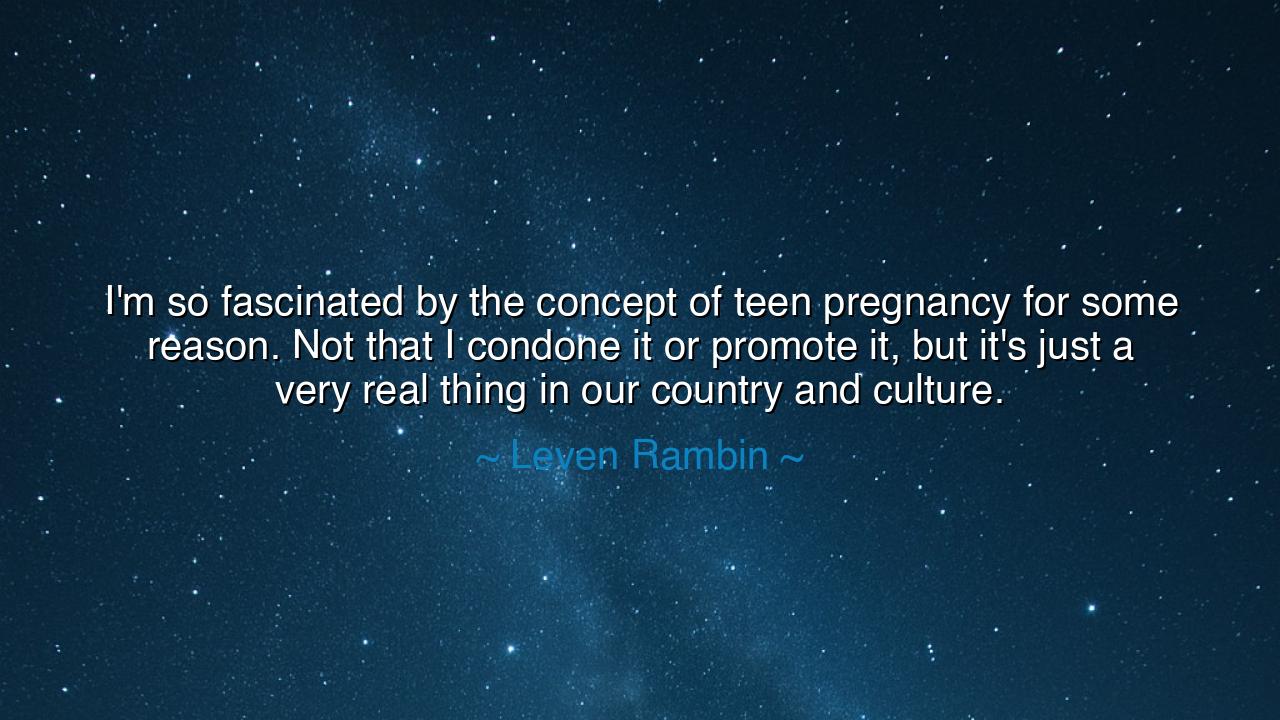
I'm so fascinated by the concept of teen pregnancy for some
I'm so fascinated by the concept of teen pregnancy for some reason. Not that I condone it or promote it, but it's just a very real thing in our country and culture.






Leven Rambin once admitted with thoughtful curiosity: "I'm so fascinated by the concept of teen pregnancy for some reason. Not that I condone it or promote it, but it's just a very real thing in our country and culture." These words reveal the gaze of one who does not turn away from uncomfortable truths. She speaks not to glamorize, but to confront reality—to acknowledge that beneath the glitter of popular culture lies the lived experience of many young lives shaped by choices, circumstances, and struggles beyond their years.
The origin of this statement is found in Rambin’s own reflections as an actress observing the stories around her. In an era where media often sensationalized teen pregnancy, either through scandal or dramatization, she chose to approach it with honesty. She neither praised nor condemned, but recognized it as part of the fabric of American life—a cultural reality that demanded attention rather than denial. In her fascination we find not voyeurism, but the artist’s desire to understand and give voice to the stories that society often wishes to bury.
History, too, has known the weight of such realities. In the early 20th century, many young women who found themselves pregnant outside marriage were hidden away, shamed, or forced into silence. Yet it was the courage of writers like Zora Neale Hurston, who gave voice to women’s struggles in works such as Their Eyes Were Watching God, that revealed the humanity beneath the stigma. Like Rambin, Hurston showed that to confront the truth of life—even when painful—is to offer healing through recognition and visibility.
Rambin’s words also draw our attention to the tension between culture and morality. She makes clear that to recognize a reality is not to condone it. Too often society mistakes acknowledgment for approval. But to ignore or silence the struggles of young mothers is to abandon them to shame and isolation. True wisdom lies in seeing without judgment, and from that seeing, extending compassion. Her fascination is thus a call to empathy—to look upon lives often dismissed, and to understand the forces that shape them.
At the heart of her statement is the truth that stories matter. Teen pregnancy is not simply a statistic, but a human tale—of families disrupted, of resilience tested, of love found and sometimes lost. By naming it, by drawing it into the light, Rambin gives dignity to those whose journeys are often overshadowed. Like an ancient scribe recording the struggles of the people, she reminds us that to look closely at the realities of youth is to glimpse the future of society itself.
For us, the lesson is clear: face reality with honesty and compassion. Do not look away from what is difficult or stigmatized, for in the shadows lie the voices that most need to be heard. Whether in your own life or in the lives of others, do not judge hastily, but listen. Seek to understand the cultural truths that shape our world, even when they unsettle you. Only by facing what is real can we hope to transform it into something better.
Therefore, children of tomorrow, carry Rambin’s wisdom with you. Do not confuse silence with virtue, nor fascination with approval. Instead, honor the truth of lived experience, however complicated. Learn to see the struggles of others not as distant curiosities but as calls to compassion. For it is in facing the realities of our culture, unflinching and unashamed, that we find the strength to build a more just and merciful world.






AAdministratorAdministrator
Welcome, honored guests. Please leave a comment, we will respond soon